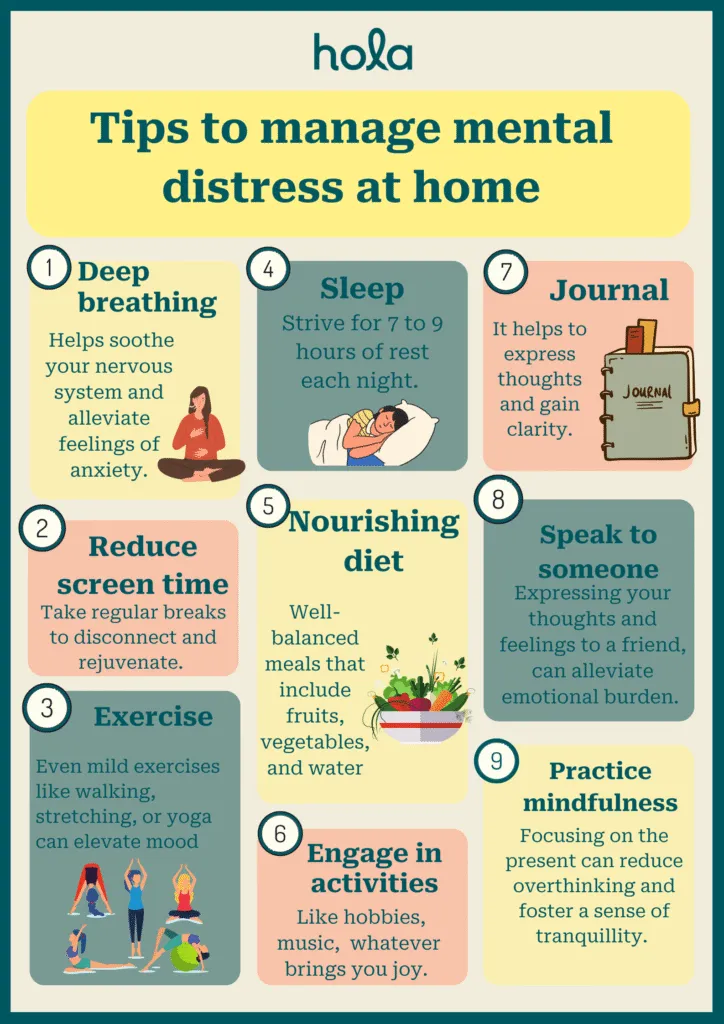What is mental distress and why does it happen?
Written by editorial staff writer at Hola. Medically reviewed by Amira Shah, MA in Counselling Psychology, Registered Psychotherapist.

Contents

Summary: Mental distress is a widespread emotional challenge affecting nearly half of Australian adults. It stems from life changes, pressures, relationships, and health issues. While not a diagnosis, it affects well-being and may cause serious problems if ignored. Identifying distress early and seeking support can ease symptoms and restore balance for better health.
Let’s be honest, life can get messy. Some days, it feels like your thoughts race and your emotions feel completely out of control. That’s mental distress, and it happens to the best of us. In fact, from 2020 to 2022, 42.9% of Australian adults aged 16-85 experienced a mental health disorder.1 You are not alone, and you are not without options. Understanding mental distress is the first step toward healing, finding help, and remembering that brighter days are well within reach. Ready to dive in? Let’s go!
What is mental distress?
Mental distress denotes a condition of emotional pain or psychological discomfort that impacts an individual's thoughts, feelings, or actions. It can encompass emotions like anxiety, sadness, fear, irritability, confusion, or a sense of hopelessness. This distress is frequently a response to stressful life circumstances such as trauma, loss, pressure, or significant changes. While it can occasionally be a normal part of life, chronic or severe mental distress can disrupt daily functioning, relationships, and overall health. If not addressed, it may escalate into more serious mental health issues like depression or anxiety disorders.Common signs and symptoms
Here are some typical signs and symptoms of mental distress to be aware of:- Emotional symptoms: Continual sadness, irritability, mood fluctuations, anxiety, or feelings of hopelessness and being overwhelmed.
- Cognitive symptoms: Challenges in focusing, racing thoughts, persistent worry, difficulty in making decisions, or a sense of mental “fog” or confusion.
- Behavioural symptoms: Social withdrawal, changes in eating or sleeping habits, neglecting duties, or resorting to substances for coping.
- Physical symptoms: Exhaustion, headaches, muscle tension, gastrointestinal issues, rapid heart rate, or unexplained pains.
- Social symptoms: Avoidance of social interactions, feelings of isolation, frequent conflicts in relationships, or disinterest in connecting with others.
How it can vary from person to person.
Mental distress manifests differently for each person. Individuals experience it based on their personality, life experiences, and usual methods for managing stress. Here’s how it may differ:- Different emotions: Some individuals may feel profound sadness or anxiety, while others might be easily irritated, overwhelmed, or emotionally numb.
- Physical symptoms: One person may suffer from headaches or stomach pain, while another feels consistently fatigued or has difficulty sleeping well.
- Coping styles: Some may isolate themselves and avoid social situations, while others might keep themselves busy, work excessively, or seek distractions like food, screens, or substances.
- Cultural and personal background: Cultural influences and upbringing affect how someone displays distress. Some might express themselves openly, while others prefer to keep it private.
- Severity and timing: For some, mental distress may be brief and manageable; for others, it can be prolonged and more intense, particularly without support.
Ready for positive change? Start your mental health care plan here.
Book an appointment
Fully bulk-billed, across Australia.
Why does mental distress happen?
Here are some frequent triggers for mental distress:- Stressful life events: Significant changes, such as the death of a loved one, job loss, divorce, or relocation, can elicit strong emotional reactions.
- Ongoing pressure: Consistent stress from academics, work, financial issues, or relationships can accumulate and lead to burnout or anxiety over time.
- Trauma or past experiences: Experiencing or witnessing abuse, violence, or neglect, especially during childhood, can result in enduring emotional consequences.
- Poor coping skills: When individuals lack healthy coping mechanisms for stress, they may become overwhelmed more readily and experience increased distress.
- Isolation or lack of support: Feeling isolated or lacking support during challenging times can intensify distress, especially without someone to confide in.
- Underlying mental health conditions: Mental health issues such as anxiety, depression, or PTSD can heighten sensitivity to stress or emotional pressure.
Mental distress vs. mental illness: what’s the difference?
Mental distress and mental illness are interconnected yet distinct. Here's an explanation to clarify the difference: Mental distress is a fleeting emotional reaction to difficult life circumstances. It represents your mind's response to stress, pressure, or challenging events, like exams, loss, or conflicts. It can lead to feelings of sadness, anxiety, or irritability, but typically improves with rest, support, or time. Everyone encounters mental distress at various points in their lives. Conversely, mental illness is a diagnosable medical condition. It consists of enduring patterns of thoughts, feelings, or behaviours that disrupt daily life. Examples include depression, anxiety disorders, bipolar disorder, and schizophrenia. Mental illness often necessitates professional treatment, such as therapy, medication, or a combination of both.Tips to manage mental distress at home
Here are several straightforward and effective strategies for managing mental distress at home:- Engage in deep breathing: Taking slow, deep breaths helps soothe your nervous system and alleviate feelings of anxiety or panic.
- Ensure adequate sleep: Strive for 7 to 9 hours of rest each night. A consistent sleep routine enhances mood and mental sharpness.
- Remain physically active: Even mild exercises like walking, stretching, or yoga can elevate mood and help release accumulated tension.
- Reduce screen time: Excessive time spent on devices, social media, or news can heighten stress. Make sure to take regular breaks to disconnect and rejuvenate.
- Consume nourishing foods: Well-balanced meals that include fruits, vegetables, and water support both physical and mental well-being.
- Speak to someone you trust: Expressing your thoughts and feelings to a friend, family member, or support line can alleviate emotional burden.
- Document your thoughts: Journaling allows you to express emotions and gain clarity on your thoughts and feelings.
- Engage in enjoyable activities: Participate in hobbies, creative pursuits, music, or anything that brings you peace or joy.
- Practice mindfulness or meditation: Focusing on the present can reduce overthinking and foster a sense of tranquillity.

How Hola Health can help in mental distress
Hola Health is an Australian online platform that offers accessible and affordable mental health plan support from the comfort of home. It provides complimentary, Medicare-funded Mental Health Treatment Plans via telehealth, allowing you to access up to 10 subsidised therapy sessions. You can consult a online GP or psychologist online, often within minutes, without the need to visit a clinic. Their mobile app enables you to manage prescriptions, referrals, and appointments all in one location. Whether you are experiencing anxiety, depression, or stress, Hola Health delivers personalised mental health treatment plans that may encompass therapy, lifestyle recommendations, or medication. They also furnish expert-approved self-care tips and resources to assist you in coping between sessions. Hola Health makes managing your mental health easier with its flexible, confidential, and user-friendly support, especially during difficult times. It is an excellent choice for those seeking help without the hassle of long waiting times or the need for travel.Conclusion:
Mental distress is real, but it doesn’t define you. With the right support and steady daily actions, you can shift from stressed to strong. You’ve got this, and better days are on the way!FAQs
Is mental distress the same as mental illness?
No, mental distress is a temporary emotional struggle, while mental illness is a clinically diagnosed disorder that affects mood, thinking, or behaviour. Distress can be a sign, but it doesn’t always mean someone has a mental disorder.How do I know if I’m experiencing mental distress?
You may experience feelings of overwhelm sadness, irritability, anxiety, or struggle to deal with everyday demands. Changes in your sleep, appetite, or energy levels can also be indicators. If these feelings persist or disrupt your daily life, it could be a sign of mental distress.When should I speak to a doctor or mental health professional?
If feelings of distress continue for more than a few weeks, interfere with your routine, or cause intense worry, sadness, or despair, it’s wise to seek expert advice. Early intervention can make a big difference in recovery.Can I get a mental health plan through Hola Health?
Yes, you can get a Mental Health Treatment Plan through Hola Health. You can book a telehealth appointment with a general practitioner (GP) who can create a Mental Health Treatment Plan for you. This plan helps you get Medicare-funded therapy sessions, making professional support budget-friendly and convenient, all without leaving your home.Is it normal to feel mental distress sometimes?
Yes, it is natural to experience mental distress occasionally. Life’s highs and lows can trigger stress and tough emotions. What’s important is how frequently and intensely it affects you and knowing when to reach out for help if it becomes too much.Can lifestyle changes help reduce mental distress?
Yes, healthy habits like consistent physical activity, good sleep, nutritious eating, mindfulness, and social connection can ease mental distress and boost emotional well-being. Even minor changes can lead to significant improvements over time.Take control of your mental health. Begin your care plan now.
Book an appointment
Fully bulk-billed, across Australia.
What we treat
- Cough
- Nausea & vomiting
- Fever
- Hayfever
- Fatigue
- Sore throat
- Acne
- Hair loss
- Gout
- Eczema
- Rosacea
- Sunburn
- UTI
- Erectile dysfunction
- Contraception
- Morning sickness
- Morning after pill
- Prostate health
- Anxiety
- Depression
- Stress
- Grief & loss
- Antidepressants
- Premature ejaculation
- Asthma
- Blood pressure
- Blood thinners
- Diabetes
- Cholesterol
- Migraines & headaches
- Allergies
- Body ache
- Heartburn & reflux
- Sleep disorder
- Pain relief
- Gastro
Related Articles
What Is Online Therapy? Everything You Need To Know About e-Therapy
February 19, 2026Mental Health
...
Disclaimer
This blog is for general informational purposes only and does not indicate that Hola Health provides all treatments or preventive measures mentioned. It is not intended to be a substitute for professional medical advice. Always seek the guidance of your doctor or other qualified health professional with any questions you may have regarding your health or a medical condition. For emergencies please immediately contact 000. Any medical topics discussed are intended to educate, not to imply availability through Hola Health.
 Facebook
Facebook  X
X  Copy Link
Copy Link



